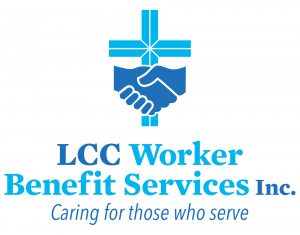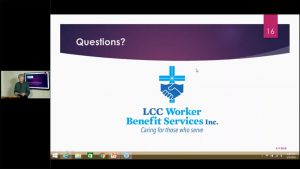LCC Worker Benefit Services holds successful information tour
 Starting in January, 2018, representatives of the Worker Benefit Services (WBS) hosted a series of 14 regional presentations to more than 450 church leaders throughout the Lutheran Church Canada (LCC) Synod. WBS is the newly created administrative organization responsible for LCC’s pension and benefits plan.
Starting in January, 2018, representatives of the Worker Benefit Services (WBS) hosted a series of 14 regional presentations to more than 450 church leaders throughout the Lutheran Church Canada (LCC) Synod. WBS is the newly created administrative organization responsible for LCC’s pension and benefits plan.
The presentations were held to explain WBS’ mandate and to introduce new agreements with employers (congregations and institutions). Representatives provided relevant information to the program and responded to a number of questions from attendees. In each presentation, WBS Board Chair, Rev. Dr. Dieter Kays recounted the history of the plans and then focused on the current challenges facing LCC’s Defined Benefit (DB) pension plan, which is still recovering from the 2008-9 recession. The historically low-interest rates imposed at the time, resulted in a significant deficit for a majority of DB pensions in Canada – including the LCC’s plan. Rev. Kays discussed the progress WBS has made dealing with this and other issues.
Rev. Kays explained how employers collectively fund the pensions for pastors and church workers who currently serve them and have served them in the past. The new agreements acknowledge the joint responsibility each participating employer has for making sure the pension plan remains healthy. The most recent valuation of the Defined Benefit plan indicated it is currently on a 80% solvency basis, up from an estimated 62%, shortly after the Great Recession began. On a “going concern” basis it is 100% funded and is able to meet all its current obligations. The gains in solvency are from a combination of a special assessment from employers and strong returns on investments.
The LCC church worker pension plans has been and continues to be highly regulated and monitored by the Superintendent of Pensions for the Province of Alberta, CRA and a host of other regulatory bodies. Never would the Regulator or CRA allow pension funds to be used for any other purpose than church workers’ pensions.
“We appreciated the high level of engagement by so many people and congregations,” said Rev. Kays. “Excellent questions and feedback demonstrated to us again the importance of transparency and accountability.” Positive evaluations from participants emphasized how much the effort to communicate in person was appreciated.
The underfunding of the plan relates only to what is called the ‘solvency ratio’ which is a measure of the amount of money needed to guarantee the retirement benefits of workers if the plan were dissolved today and every worker were given the necessary money to ensure they had a sufficient money to fund their retirement benefits.
The solvency ratio only becomes a factor for a congregation if they wish to withdraw from the plan. At that point their share of the solvency deficit is crystallized and they need to make arrangements to pay it. This is a negotiated process with the employer and placing an interest on their property to receive payment when the property is sold, is one of several options open to an employer. There is nothing in the agreement that obligates a congregation to choose this option.

WBS Webinar Screen Capture
On an ongoing basis however, the plan is measured on an actuarially calculated ratio called the ‘Going Concern Ratio’. This measures the ability of the plan to pay its member benefits until the last member dies. On the basis of this measure the plan is now 100% funded. This is the most important measure since LCC is not intending to wrap up the plan.
In addition to Rev. Kays, WBS executive director Dwayne Cleave was either on site or readily accessible to answer questions some of which required written follow-up.
The solvency deficit in the plan is not unique. During the Great Recession (starting in 2008-2009), when interest rates plummeted to almost zero, the vast majority of defined benefit plans were in a deficit position. This resulted in a majority of employers moving to defined contribution plans. This is what the LCC did in 2012. The existing earned benefits however must be honored. While solvency funding ratios have improved, the Alberta Regulator published a study in late 2017 that indicated more than 60% of the defined benefit plans in their Alberta study were under funded.
Each employer received a package either at the meeting or by mail containing an overview of the process as well as copies of the agreements. One agreement deals with the benefit plans and the other with the pension plan. The obligation for employers to make payment to satisfy their share of the solvency deficit existed before the formation of the new corporation and is not new. Congregations that have withdrawn from the plans or have closed, have been expected to make payment as a part of the withdrawal process.
Cleave indicated that it is important for employers to process the agreements in a timely manner and return the signed documents to LCC to ensure that the enrollment of their church workers continues uninterrupted. This is the second time WBS has conducted information sessions across Canada. In 2010 the former Worker Benefit Plans met with plan members to introduce changes to the pension plan. The major factor contributing to the solvency deficit continues to be low-interest rates and an increase in the actuarial longevity table.
The new agreements are necessary because the LCC Board of directors has incorporated a new corporation called Worker Benefit Services. The agreements are designed to clearly state the responsibilities of WBS as well as those of the employers in order to enhance transparency and accountability over a very critical area. However, these agreements do not change the current existing responsibilities of employers or member benefits. Neither are they increasing the premiums that employers are being expected to pay.
The Worker Benefit Services (WBS) board is made up of competent, governance, and financial services experts who take their fiduciary responsibility very seriously. Of the 5 board members, one has a PhD in leadership and organizational effectiveness, with 37 years of general management experience; another is the retired assistant superintendent of the Alberta Pension Regulator and a non LCC member; another has his own accounting firm and extensive governance experience; another is a partner in an international accounting firm. Only 1 director of WBS is a member of the plan and receives benefits from it.
The webinar presentation on WBS agreements is available for viewing on the Worker Benefits website: www.LCCBenefits.ca/employer or directly on YouTube at https://youtu.be/Gsgrwvtanj8. Resource people can be made available if churches have questions and would like further clarification.




